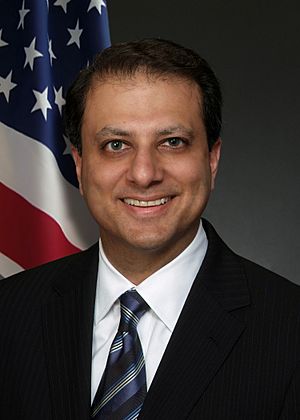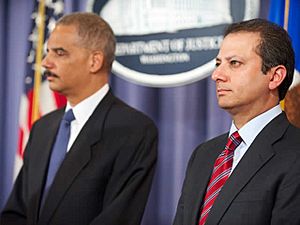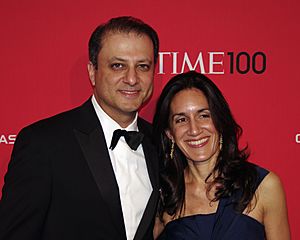Preet Bharara facts for kids
Quick facts for kids
Preet Bharara
|
|
|---|---|

Official portrait, 2009
|
|
| United States Attorney for the Southern District of New York | |
| In office August 13, 2009 – March 11, 2017 |
|
| President | Barack Obama Donald Trump |
| Preceded by | Michael J. Garcia |
| Succeeded by | Joon Kim (acting) |
| Personal details | |
| Born |
Preetinder Singh Bharara
October 13, 1968 Firozpur, Punjab, India |
| Political party | Democratic |
| Spouse | Dalya Bharara |
| Children | 3 |
| Education | Harvard University (BA) Columbia University (JD) |
| Signature | |
Preetinder Singh Bharara (born October 13, 1968) is an Indian American lawyer. He is best known for his time as the United States Attorney for the Southern District of New York from 2009 to 2017. A U.S. Attorney is a top lawyer who represents the government in court. As of 2025, he is a partner at the WilmerHale law firm.
During his time as U.S. Attorney, Bharara became famous for taking on powerful criminals. His office prosecuted nearly 100 executives from Wall Street for financial crimes. He also took on powerful politicians from both the Democratic and Republican parties for public corruption. His work against organized crime groups like the Italian mafia was also very successful.
Bharara's work sometimes caused issues with other countries. A case against an Indian diplomat strained relations between India and the U.S. In 2013, Russia banned him from entering the country after he investigated a money laundering case. In 2017, President Donald Trump dismissed Bharara from his position.
Contents
Early Life and Education
Preet Bharara was born in 1968 in Firozpur, India. His family moved to the United States when he was two years old. He grew up in New Jersey and became a U.S. citizen when he was 12. He was the valedictorian (top student) of his high school class in 1986.
Bharara went to two of the most famous universities in the country. He earned a degree from Harvard College in 1990. He then earned a law degree from Columbia Law School in 1993.
After law school, Bharara worked for private law firms. From 2000 to 2005, he worked as an assistant U.S. Attorney in Manhattan. There, he prosecuted cases against organized crime gangs. Later, he worked as the chief counsel for U.S. Senator Chuck Schumer from 2005 to 2009.
U.S. Attorney for the Southern District of New York
In 2009, President Barack Obama appointed Bharara as the U.S. Attorney for the Southern District of New York. This is one of the most important legal jobs in the country. He was confirmed for the job by the U.S. Senate without any opposition.
During his time in this role, Bharara received many awards. In 2012, Time magazine named him one of "The 100 Most Influential People in the World." He was known for being tough on crime, no matter who was involved.
Fighting Financial Crime

Bharara became famous for fighting crimes on Wall Street, the financial center of the U.S. His office prosecuted many people for insider trading. This is when someone uses secret information to buy or sell stocks, which is illegal.
- Galleon Group Case: His office investigated a major insider trading case involving more than 60 people. The main person, Raj Rajaratnam, was found guilty on 14 charges.
- SAC Capital: In 2013, Bharara's office charged a large hedge fund called SAC Capital Advisors. The company had to pay $1.8 billion, the largest settlement ever for insider trading at the time.
- Major Banks: Bharara's team also took on some of the biggest banks. They charged Citibank, JPMorgan Chase, and Bank of America for various wrongdoings. These cases resulted in the banks paying billions of dollars in penalties.
Tackling Public Corruption
Bharara believed it was important to stop corruption in government. He often said that his office took this responsibility very seriously.
His office prosecuted several politicians for breaking the law. One of the most famous cases was against Sheldon Silver. Silver was the powerful Speaker of the New York State Assembly. He was arrested in 2015 for taking millions of dollars in illegal payments. Silver was found guilty and lost his position in the government.
Fighting Organized Crime and Terrorism
Bharara's office was also tough on gangs and organized crime. Between 2009 and 2014, his office convicted over 1,000 people involved in street gangs. In 2011, his office was part of the largest single-day operation against the Mafia in U.S. history.
He also oversaw many important terrorism cases.
- His office prosecuted Faisal Shahzad, the man who tried to set off a bomb in Times Square in 2010.
- They also convicted several high-ranking members of Al-Qaeda, including Osama bin Laden's son-in-law.
- Bharara believed that terrorists should be tried in regular American courts to show that the justice system is fair and strong.
The Devyani Khobragade Case
In 2013, Bharara's office arrested Devyani Khobragade, an Indian diplomat working in New York. She was accused of lying on a visa application for her housekeeper and not paying her a fair wage.
The arrest caused a major disagreement between the U.S. and India. The Indian government felt their official was treated poorly. In response, they took away some privileges from American diplomats in India. The case against Khobragade was later dismissed because she was granted a higher level of diplomatic immunity.
Dismissal in 2017
After the 2016 presidential election, President-elect Donald Trump met with Bharara. Trump asked him to stay in his job, and Bharara agreed.
However, on March 10, 2017, Attorney General Jeff Sessions asked all 46 remaining U.S. Attorneys from the Obama administration to resign. Bharara refused to resign and was fired the next day. He later said that he had become uncomfortable with phone calls from President Trump and believed that was why he was dismissed.
Later Career
After leaving his job as U.S. Attorney, Bharara found new ways to share his knowledge. In April 2017, he joined New York University School of Law as a distinguished scholar.
He also started a popular weekly podcast called "Stay Tuned with Preet." On the show, he interviews famous people from law, politics, and other fields. He also co-hosts another legal podcast called "Cafe Insider." As of 2025, he works as a partner at the law firm WilmerHale.
Personal Life
Bharara is married to Dalya Bharara. They live in New York and have three children. His family has a diverse religious background, which he has spoken about in interviews.
His younger brother, Vinnie Bharara, is a successful businessman. He co-founded the company that created Diapers.com, which was sold to Amazon.com for $540 million in 2010.
Preet Bharara is a big fan of the musician Bruce Springsteen. At a concert in 2012, Springsteen gave a shout-out to Bharara before playing one of his songs.
See also
- Indians in the New York City metropolitan region
- Legal affairs of the first Donald Trump presidency
 | Emma Amos |
 | Edward Mitchell Bannister |
 | Larry D. Alexander |
 | Ernie Barnes |


